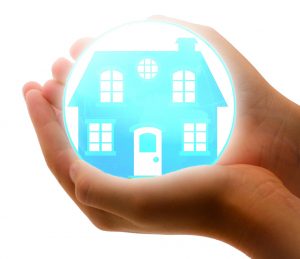With mortgage rates at an all-time low, you might be considering purchasing a new home. And whether this is your first home or your 5th home, you’ll likely purchase homeowners insurance for it.

For some, the process of purchasing insurance can be a blur. Your mortgage lender probably told you homeowners insurance was the final item you needed to be fully approved for a home loan. So, in a panic, you called your car insurance company, gave them your soon-to-be address, and got coverage. A week later, your policy package shows up in the mail. Boom, done!
As you’re reading through your ‘chapter-sized’ policy documents, you begin to realize that your policy might be a little difficult to understand. Listed below are 12 basic questions answered to give you a better overall picture of how homeowners insurance works.
-
What is homeowners insurance?
Homeowners insurance is a form of property and casualty insurance. It primarily covers your house and the contents inside of it in the event of theft or some disasters.
-
Wait…some disasters?
Yes. Homeowners insurance commonly covers these perils: fire, windstorm, hail, lightning, smoke, explosion, theft, riot and vehicle collision. It commonly excludes (doesn’t cover) earthquakes, floods, war, power failure, nuclear explosion, neglect, and intentional damage.
-
Is homeowners insurance required by law?
No. Unlike auto insurance, Texas does not require you to have homeowners insurance. However, if you’re financing a house, your mortgage lender will require you to get coverage.
-
Why do I need homeowners insurance?
Homes are expensive and disasters don’t discriminate! Mic drop! In 2017 Hurricane Harvey destroyed thousands of homes and displaced more than 30,000 people in the Houston area.
-
So, homeowners insurance will replace my house if destroyed?
Short answer: If your house is destroyed by a covered peril, a standard homeowners policy will go a long way towards repairing or rebuilding your home.
-
What’s the long answer?
A homeowners insurance payout is determined by the fine print of your policy. For example, your policy will have coverage limits. If your house itself (or “dwellingâ€) is insured for up to $350,000, you will not get more than that to replace it. You could even get less, depending on how your policy is set up to payout.
-
There’s more than one way a policy will payout?
Yes – replacement cost vs actual cash value. A replacement cost homeowners insurance policy pays claims based on the cost of rebuilding or repairing your home or property at the time it is damaged or destroyed. An actual cash value homeowners insurance policy pays claims after accounting for any depreciation in your home’s value or the personal property.
-
How much homeowners insurance do I need?
It really depends on the size of the home you are purchasing, the location of the home, the condition of your home, and how much stuff you have…
-
How much stuff I have?
Yes, because homeowners insurance provides coverage for your possessions too, just like renters insurance. You’ll have a total coverage limit for personal belongings and individual limits for high-priced items like jewelry. The rule of replacement cost vs. actual cash value would apply here too.
-
So, what else does homeowners insurance cover?
In addition to the dwelling and your personal belongings, a standard policy covers liability in the event someone injures themselves at or around your house. It also covers loss of use, which basically pays for temporary housing while your house is under repair. Separate coverage limits apply to each category.
-
So how can I lower the cost of homeowners insurance?
You can opt for a higher deductible – that’s the amount of money you’ll have to pay out of pocket before your insurance kicks in. But less risky ways to save include bundling your homeowners insurance with your auto, or asking if you qualify for any discounts.
-
What homeowners insurance discounts are there?
Some homeowners insurance companies offer discounts for first-time homeowners or first-time customers. You might also get a discount by adding security features to your home, like an alarm system.
Any additional questions? Give our agency a call at 512-399-5218 and we’d be happy to discuss!

